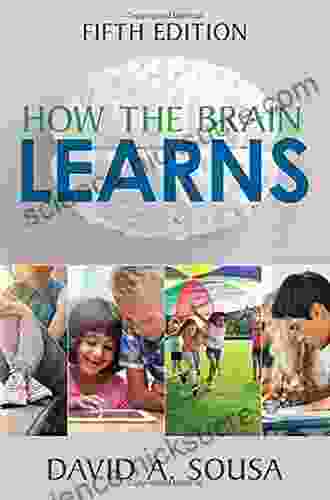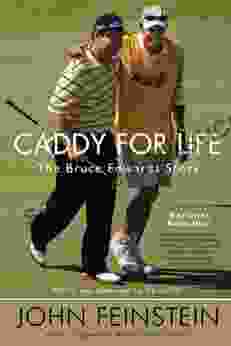How the Brain Learns: A Comprehensive Guide by David Sousa

5 out of 5
| Language | : | English |
| File size | : | 14999 KB |
| Text-to-Speech | : | Enabled |
| Screen Reader | : | Supported |
| Enhanced typesetting | : | Enabled |
| Word Wise | : | Enabled |
| Print length | : | 336 pages |
The human brain is an incredibly complex organ, responsible for everything from our thoughts and feelings to our movements and memories. As educators, it is essential that we understand how the brain learns in order to create effective teaching environments. In his book, "How the Brain Learns," renowned educational psychologist David Sousa provides a comprehensive overview of the latest research on brain-based learning.
The Triune Brain
According to Sousa, the human brain can be divided into three parts: the reptilian brain, the mammalian brain, and the neocortex. The reptilian brain is responsible for our basic survival instincts, such as fight, flight, and freeze. The mammalian brain is responsible for our emotions, memories, and social interactions. The neocortex is responsible for our higher-level cognitive functions, such as language, reasoning, and problem-solving.
Sousa emphasizes that all three parts of the brain are essential for learning. The reptilian brain ensures that we are safe and secure, the mammalian brain helps us to make sense of our experiences, and the neocortex allows us to learn and solve problems.
How the Brain Learns
Sousa identifies five key principles of how the brain learns:
- The brain is a pattern-seeking organ. We are constantly looking for patterns in our environment in order to make sense of the world around us. When we learn new information, we try to fit it into existing patterns or create new patterns to accommodate it.
- The brain is social. We learn best when we are interacting with others. Social interaction helps us to understand new information, remember it, and apply it to our lives.
- The brain is emotional. Emotions play a powerful role in learning. When we are emotionally engaged in a topic, we are more likely to pay attention, remember it, and apply it to our lives.
- The brain is experiential. We learn best by ng. Hands-on experiences allow us to explore our environment, discover new things, and make connections between different pieces of information.
- The brain is reflective. We need time to reflect on what we have learned in order to make meaning of it and apply it to our lives. Reflection helps us to identify what we have learned, how we learned it, and how we can use it.
Implications for Teaching
Sousa's research has a number of implications for teaching and learning. By understanding how the brain learns, we can create more effective learning environments for our students. Some specific implications include:
- Provide students with opportunities to explore and discover. Hands-on experiences allow students to learn by ng, which is one of the most effective ways to learn.
- Create a social environment for learning. Cooperative learning and other forms of social interaction can help students to learn from each other and make the learning process more enjoyable.
- Use emotions to engage students. When students are emotionally engaged in a topic, they are more likely to pay attention, remember it, and apply it to their lives.
- Provide students with time to reflect. Reflection is essential for learning. Give students time to think about what they have learned, how they learned it, and how they can use it.
- Use a variety of teaching methods. Different students learn in different ways. By using a variety of teaching methods, you can reach all of your students and help them to learn.
David Sousa's research on how the brain learns has provided us with a wealth of knowledge that can help us to create more effective learning environments for our students. By understanding the principles of brain-based learning, we can help our students to reach their full potential.
5 out of 5
| Language | : | English |
| File size | : | 14999 KB |
| Text-to-Speech | : | Enabled |
| Screen Reader | : | Supported |
| Enhanced typesetting | : | Enabled |
| Word Wise | : | Enabled |
| Print length | : | 336 pages |
Do you want to contribute by writing guest posts on this blog?
Please contact us and send us a resume of previous articles that you have written.
 Fiction
Fiction Non Fiction
Non Fiction Romance
Romance Mystery
Mystery Thriller
Thriller SciFi
SciFi Fantasy
Fantasy Horror
Horror Biography
Biography Selfhelp
Selfhelp Business
Business History
History Classics
Classics Poetry
Poetry Childrens
Childrens Young Adult
Young Adult Educational
Educational Cooking
Cooking Travel
Travel Lifestyle
Lifestyle Spirituality
Spirituality Health
Health Fitness
Fitness Technology
Technology Science
Science Arts
Arts Crafts
Crafts DIY
DIY Gardening
Gardening Petcare
Petcare Mark Booth
Mark Booth Billy Walsh
Billy Walsh Timm Woods
Timm Woods Ged Jenkins Omar
Ged Jenkins Omar Beata Bliss Lewis Md
Beata Bliss Lewis Md Alan E Kazdin
Alan E Kazdin Suze Guillaume
Suze Guillaume Will Storr
Will Storr Alastair Humphreys
Alastair Humphreys Belinda Luscombe
Belinda Luscombe Josh Kilmer Purcell
Josh Kilmer Purcell Mark Harris
Mark Harris Jane Bottomley
Jane Bottomley Mykel Hawke
Mykel Hawke Jacqueline Church Simonds
Jacqueline Church Simonds Melissa Bashardoust
Melissa Bashardoust Peg Tyre
Peg Tyre John Bird
John Bird Alan Watts
Alan Watts Jay H Lefkowitch
Jay H Lefkowitch Lex Croucher
Lex Croucher Peter Ballingall
Peter Ballingall Clint Emerson
Clint Emerson Jerry Robertson
Jerry Robertson Stephanie Izard
Stephanie Izard Kevin Hunter
Kevin Hunter Thomas Kurz
Thomas Kurz Lexie Scott
Lexie Scott Francesca Lia Block
Francesca Lia Block Natazha Raine O Connor
Natazha Raine O Connor Po Bronson
Po Bronson Bradley Efron
Bradley Efron Lo Bosworth
Lo Bosworth Teresa Mccallum
Teresa Mccallum Alana Mclaren
Alana Mclaren Chris Klug
Chris Klug Frances E Jensen
Frances E Jensen Robert Macfarlane
Robert Macfarlane Alan Garner
Alan Garner Madeline Milne
Madeline Milne Kai Nacke
Kai Nacke Bettina Gordon Wayne
Bettina Gordon Wayne Bruce J Macfadden
Bruce J Macfadden Jay Speight
Jay Speight Nicholas Romanov
Nicholas Romanov Erin Ekins
Erin Ekins Marsha Wenig
Marsha Wenig Brian Mills
Brian Mills George Monbiot
George Monbiot Caitlin Zaloom
Caitlin Zaloom Kiersten White
Kiersten White G E R Lloyd
G E R Lloyd Bobby Flay
Bobby Flay Len Sperry
Len Sperry Mel Thompson
Mel Thompson Mary Basick
Mary Basick Eddy Starr Ancinas
Eddy Starr Ancinas Jacqueline Tourville
Jacqueline Tourville Rick Bass
Rick Bass David Roberts
David Roberts Charles B White
Charles B White Nancy Hughes
Nancy Hughes Jan Smith
Jan Smith Tod E Bolsinger
Tod E Bolsinger David Jason
David Jason Alan Hearnshaw
Alan Hearnshaw Elaine Howard Ecklund
Elaine Howard Ecklund Juliet Marillier
Juliet Marillier Ahmed Osman
Ahmed Osman James Witts
James Witts Lingo Mastery
Lingo Mastery Alan Burdick
Alan Burdick Howard Maxwell
Howard Maxwell Kerstin Gier
Kerstin Gier Alan E Sparks
Alan E Sparks Vasilis Konstantinos Giontzis
Vasilis Konstantinos Giontzis Courtney Macavinta
Courtney Macavinta Terry Breverton
Terry Breverton Habeeb Quadri
Habeeb Quadri Gregory J Davenport
Gregory J Davenport Arnold Haultain
Arnold Haultain Betsy Tobin
Betsy Tobin Matt Mosher
Matt Mosher Michael Domican
Michael Domican Louis Schubert
Louis Schubert Helen Palmer
Helen Palmer J R Haseloff
J R Haseloff Nassim Nicholas Taleb
Nassim Nicholas Taleb Jill Stamm
Jill Stamm Gary R Varner
Gary R Varner Shaun Tomson
Shaun Tomson Helen Hollick
Helen Hollick Skeleton Steve
Skeleton Steve Dawn Sakamoto Paiva
Dawn Sakamoto Paiva Deitra Leonard Lowdermilk
Deitra Leonard Lowdermilk Laurie Pickard
Laurie Pickard Peter Hathaway Capstick
Peter Hathaway Capstick Christopher Willard
Christopher Willard Sonia Nazario
Sonia Nazario Anne Enright
Anne Enright Dave Heller
Dave Heller Jacqueline Fitzpatrick
Jacqueline Fitzpatrick Michael Miller
Michael Miller Don Casey
Don Casey James A Michener
James A Michener Linda G Morris
Linda G Morris I Johnson
I Johnson David Crabtree
David Crabtree Benjamin Johnston
Benjamin Johnston Pantea Kalhor
Pantea Kalhor Bryan Mann
Bryan Mann Damon Lee
Damon Lee Jakob Tanner
Jakob Tanner Mike Martin
Mike Martin Donald Woods Winnicott
Donald Woods Winnicott The Rogue Hypnotist
The Rogue Hypnotist Dan Dipiro
Dan Dipiro Aimee Aristotelous
Aimee Aristotelous Robert L Kelly
Robert L Kelly Mike Rothschild
Mike Rothschild Original Edition Kindle Edition
Original Edition Kindle Edition R A Salvatore
R A Salvatore Aja Raden
Aja Raden Andrew Rowe
Andrew Rowe Sarah Hendrickx
Sarah Hendrickx Katharine Graves
Katharine Graves Craig Childs
Craig Childs Aitzaz Imtiaz
Aitzaz Imtiaz Publishdrive Edition Kindle Edition
Publishdrive Edition Kindle Edition Micky Ward
Micky Ward Robin Mckinley
Robin Mckinley Leigh Sales
Leigh Sales Jordon Greene
Jordon Greene Dmitry Zinoviev
Dmitry Zinoviev Kidada Jones
Kidada Jones Lecile Harris
Lecile Harris Tim Gallagher
Tim Gallagher Judith Garrard
Judith Garrard Satya Sundar Sethy
Satya Sundar Sethy Sophia Joy
Sophia Joy Sam J Fires
Sam J Fires Al Macy
Al Macy Mariam N Ottimofiore
Mariam N Ottimofiore Bill Walker
Bill Walker Catherine Belknap
Catherine Belknap Steven Trimble
Steven Trimble Al Yellon
Al Yellon E A Koetting
E A Koetting Amelia Mayer
Amelia Mayer Dave Whitson
Dave Whitson Taquetta Baker
Taquetta Baker Barbara Oehlberg
Barbara Oehlberg Andy Adams
Andy Adams Zita West
Zita West Penney Peirce
Penney Peirce Contractor Education Inc
Contractor Education Inc Alice Oseman
Alice Oseman Michal Stawicki
Michal Stawicki Samuel N Rosenberg
Samuel N Rosenberg Erin Lovelace
Erin Lovelace Zondervan
Zondervan Edward A Tiryakian
Edward A Tiryakian Michael D Rich
Michael D Rich Larry Wasserman
Larry Wasserman We Fairbairn
We Fairbairn Ndeye Labadens
Ndeye Labadens Helena Clare
Helena Clare Susan B Lovejoy
Susan B Lovejoy Meredith Marsh
Meredith Marsh Christos A Djonis
Christos A Djonis Magnus Thollander
Magnus Thollander Ken Denmead
Ken Denmead Gill Rapley
Gill Rapley Andre Agassi
Andre Agassi Ann Hagedorn
Ann Hagedorn Kerry Diamond
Kerry Diamond Anna Hickey Moody
Anna Hickey Moody Paul G Schempp
Paul G Schempp Nick Lyons
Nick Lyons Jessica Cunsolo
Jessica Cunsolo Antipodean Writer
Antipodean Writer Jacob K Olupona
Jacob K Olupona Joe Bertagna
Joe Bertagna Layla Moon
Layla Moon Massad Ayoob
Massad Ayoob Farlex International
Farlex International Jonathan White
Jonathan White Barbara Scott
Barbara Scott Vera Nazarian
Vera Nazarian Joanne Webb
Joanne Webb Amelia Simmons
Amelia Simmons W E Fairbairn
W E Fairbairn Andrea Travillian
Andrea Travillian Bianca Smith
Bianca Smith Alan Margot
Alan Margot Dimitri Loose
Dimitri Loose Alan S Gurman
Alan S Gurman J Zoltan
J Zoltan Gary B Ferngren
Gary B Ferngren 12th Edition Kindle Edition
12th Edition Kindle Edition Linda Welters
Linda Welters Clyde Fitch
Clyde Fitch Gordon R Dickson
Gordon R Dickson Esther Parry
Esther Parry Marc M Triola
Marc M Triola Harriet Brown
Harriet Brown Kevin B Shearer
Kevin B Shearer G H Hardy
G H Hardy Tenth Edition Revised Kindle Edition
Tenth Edition Revised Kindle Edition Constance Classen
Constance Classen John H Moore
John H Moore Vanessa Ogle
Vanessa Ogle Douglas Noll
Douglas Noll Howard Greene
Howard Greene Anders Halverson
Anders Halverson Alan Rouse
Alan Rouse Toby Wilkinson
Toby Wilkinson Jay Annelli
Jay Annelli Judy Jewell
Judy Jewell Florence Williams
Florence Williams Steven Horak
Steven Horak Robert A Sadowski
Robert A Sadowski Charlotte Markey
Charlotte Markey Arnold Yates
Arnold Yates Tonya Johnston
Tonya Johnston Saul Rip
Saul Rip Steven H Strogatz
Steven H Strogatz Lisa Marasco
Lisa Marasco Melinda Rushe
Melinda Rushe Joe Berardi
Joe Berardi Dusty Rhodes
Dusty Rhodes Aiva Books
Aiva Books James Gleick
James Gleick Mark Occhilupo
Mark Occhilupo Alan Gelb
Alan Gelb Cindy Hudson
Cindy Hudson Brandy Roon
Brandy Roon Samuel Carbaugh
Samuel Carbaugh Rehana Jawadwala
Rehana Jawadwala Conor Daly
Conor Daly Roxy And Ben Dawson
Roxy And Ben Dawson Hervey Garrett Smith
Hervey Garrett Smith Amye Archer
Amye Archer James Willard Schultz
James Willard Schultz Jay Revell
Jay Revell Emeran Mayer
Emeran Mayer Mista Nove
Mista Nove Brenda Nathan
Brenda Nathan Akil Palanisamy
Akil Palanisamy Harold Klemp
Harold Klemp Rose Lynn Fisher
Rose Lynn Fisher Ken Schultz
Ken Schultz Daphne Rose Kingma
Daphne Rose Kingma Tom Shachtman
Tom Shachtman Jackson Katz
Jackson Katz Matthew Sturm
Matthew Sturm Jeanne Faulkner
Jeanne Faulkner Joyce Burkhalter Flueckiger
Joyce Burkhalter Flueckiger Jessica Battilana
Jessica Battilana Margit Ystanes
Margit Ystanes Dylan Alcott
Dylan Alcott Megan Gray Md
Megan Gray Md Kate Bettison
Kate Bettison Pavel Tsatsouline
Pavel Tsatsouline Karen Levin Coburn
Karen Levin Coburn Jane P Gardner
Jane P Gardner Al Roker
Al Roker Vernon Coleman
Vernon Coleman Christopher Hellman
Christopher Hellman Scott Surovich
Scott Surovich Bob Mayer
Bob Mayer Marcus Chown
Marcus Chown David F Kelly
David F Kelly Michael Sidgwick
Michael Sidgwick Alana Chernila
Alana Chernila Lisa Newton
Lisa Newton Thubten Chodron
Thubten Chodron Olivia Gentile
Olivia Gentile George E Andrews
George E Andrews Grace Lebow
Grace Lebow Martin Rooney
Martin Rooney George Plimpton
George Plimpton Alice Scordato
Alice Scordato Spencer Wells
Spencer Wells William Harding
William Harding Kareem Abdul Jabbar
Kareem Abdul Jabbar Hannah Ewens
Hannah Ewens Noel St Clair
Noel St Clair Cynthia Clumeck Muchnick
Cynthia Clumeck Muchnick Terry L Duran
Terry L Duran Alan Murchison
Alan Murchison Noha Mellor
Noha Mellor Nilakantasrinivasan J Neil
Nilakantasrinivasan J Neil Timothy C Smith
Timothy C Smith Alan Booth
Alan Booth Richard Pears
Richard Pears Nick Hughes
Nick Hughes Daniel C Okpara
Daniel C Okpara Hope Smith
Hope Smith Stephen Wolfram
Stephen Wolfram Jessica Cornwell
Jessica Cornwell Margaret J Wheatley
Margaret J Wheatley Jack Nicklaus
Jack Nicklaus Martin Erwig
Martin Erwig Cat Warren
Cat Warren Albert Einstein
Albert Einstein Angelina Wilson
Angelina Wilson Edupan7 Publishing
Edupan7 Publishing Nina Lacour
Nina Lacour Gayle Peterson
Gayle Peterson Kardas Publishing
Kardas Publishing Dr Guy Leschziner
Dr Guy Leschziner Rene D Zweig
Rene D Zweig Kelly Jensen
Kelly Jensen Alan Graham
Alan Graham Celeste Headlee
Celeste Headlee Anahad O Connor
Anahad O Connor Rebecca Jones
Rebecca Jones Gina Guddat
Gina Guddat Alan Vermilye
Alan Vermilye Alan Porter
Alan Porter Kiku Hughes
Kiku Hughes Pallas Snider
Pallas Snider Denise Alvarado
Denise Alvarado Dr Joseph Parent
Dr Joseph Parent Al Pasha
Al Pasha Gary Player
Gary Player Mark Goulston
Mark Goulston Gail Tully
Gail Tully Dennis Jarecke
Dennis Jarecke Leif K Karlsen
Leif K Karlsen Doug Gelbert
Doug Gelbert Kate Brian
Kate Brian Janice Selekman
Janice Selekman Jeff Maynard
Jeff Maynard Elizabeth Thompson
Elizabeth Thompson Douglas T Hall
Douglas T Hall Stephen M Camarata
Stephen M Camarata Jon Tyson
Jon Tyson John Riley
John Riley Gavin Francis
Gavin Francis Tina Dreffin
Tina Dreffin Amy Edelstein
Amy Edelstein Mike Warren
Mike Warren Jenni Hicks
Jenni Hicks Alan C Acock
Alan C Acock Christopher Gavigan
Christopher Gavigan E Cheng
E Cheng Michael Morpurgo
Michael Morpurgo John Leo
John Leo Gordon H Orians
Gordon H Orians Dorothy H Crawford
Dorothy H Crawford Douglas G Altman
Douglas G Altman David D Burns
David D Burns John Feinstein
John Feinstein Andrew Blum
Andrew Blum Shoshana Levin Fox
Shoshana Levin Fox Aidan Comerford
Aidan Comerford Chris Vines
Chris Vines Bob Plott
Bob Plott Alaina Talboy
Alaina Talboy Rosemarie Anderson
Rosemarie Anderson William Foote Whyte
William Foote Whyte Theodore P Jorgensen
Theodore P Jorgensen Aileen Erin
Aileen Erin Andrew Jamieson
Andrew Jamieson Ron L Deal
Ron L Deal Julie Bradley
Julie Bradley Orson Scott Card
Orson Scott Card George M Fredrickson
George M Fredrickson Gillian Gill
Gillian Gill Bill Friedrich
Bill Friedrich Ilan Dvir
Ilan Dvir David Vine
David Vine Al Marlowe
Al Marlowe Martin Luther King Jr
Martin Luther King Jr Chris Bowers
Chris Bowers Jeremy Miles
Jeremy Miles Al Desetta M A
Al Desetta M A Aileen Nielsen
Aileen Nielsen Letisha Galloway
Letisha Galloway Terry Funk
Terry Funk Al Strachan
Al Strachan John T Hansen
John T Hansen George Buehler
George Buehler Lee Carroll
Lee Carroll Andy Zipser
Andy Zipser Al Ristori
Al Ristori Arthur Fleischmann
Arthur Fleischmann David King
David King Aileen Evans
Aileen Evans Rand Cardwell
Rand Cardwell Aidan Dodson
Aidan Dodson Al Sweigart
Al Sweigart Jon Emmett
Jon Emmett Steve Moore
Steve Moore Alan Lightman
Alan Lightman Aphra Behn
Aphra Behn Ainsley Arment
Ainsley Arment Amanda Ford
Amanda Ford Patrick O Sullivan
Patrick O Sullivan Robert E Stake
Robert E Stake Truman Everts
Truman Everts Michael W King
Michael W King Thomas Metzinger
Thomas Metzinger Mendocino Press
Mendocino Press Rob Casey
Rob Casey Sara Hanover
Sara Hanover Frank E Harrell Jr
Frank E Harrell Jr M K Hume
M K Hume Yang Jwing Ming
Yang Jwing Ming Celeste Jones
Celeste Jones Takuan Soho
Takuan Soho Jerry Robeson
Jerry Robeson David A Sousa
David A Sousa Michael Freedland
Michael Freedland John Irving
John Irving Anthonissa Moger
Anthonissa Moger Sandy Lindsey
Sandy Lindsey Michael Shermer
Michael Shermer Snap Summaries
Snap Summaries Paramahansa Yogananda
Paramahansa Yogananda Bryon Powell
Bryon Powell Mackenzi Lee
Mackenzi Lee Jill Homer
Jill Homer Trevor Lund
Trevor Lund Alan Lawrence Sitomer
Alan Lawrence Sitomer Hammad Fozi
Hammad Fozi Carla Schroder
Carla Schroder Bruce Lee
Bruce Lee Franz Metcalf
Franz Metcalf Hiro Ainana
Hiro Ainana Carl Gustav Jung
Carl Gustav Jung Kim Stanley Robinson
Kim Stanley Robinson Al Owens
Al Owens Steve Michalik
Steve Michalik Aidan Chambers
Aidan Chambers Christopher Scordo
Christopher Scordo Erica Westly
Erica Westly Dr David Geier
Dr David Geier Lj Andrews
Lj Andrews Miles Mckenna
Miles Mckenna Donna Morang
Donna Morang Al Barkow
Al Barkow Sir Edmund Hillary
Sir Edmund Hillary Princess Her
Princess Her Robert Heidler
Robert Heidler Graham Bower
Graham Bower Mark Drolsbaugh
Mark Drolsbaugh Molly Absolon
Molly Absolon Bill Parisi
Bill Parisi Alan Shipnuck
Alan Shipnuck Deborah Harkness
Deborah Harkness Sheila Barton
Sheila Barton Jamie Baulch
Jamie Baulch Percy Boomer
Percy Boomer Emily Harris Adams
Emily Harris Adams Eden O Neill
Eden O Neill Howard Hill
Howard Hill Dean Burnett
Dean Burnett Charles J Thayer
Charles J Thayer Carol Tuttle
Carol Tuttle Alan R Hall
Alan R Hall Alan S Kaufman
Alan S Kaufman Kristine Barnett
Kristine Barnett Vishwesh Bhatt
Vishwesh Bhatt Alex Light
Alex Light S Connolly
S Connolly Michael Casey
Michael Casey Matthew Mcbee
Matthew Mcbee Isabella Morris
Isabella Morris Lisa Kenney
Lisa Kenney Gary Smith
Gary Smith Kevin Williams
Kevin Williams William A Kaplin
William A Kaplin Akwaeke Emezi
Akwaeke Emezi John Muir
John Muir Michael Gray
Michael Gray Collins Easy Learning
Collins Easy Learning Markus Rex
Markus Rex Alfred S Posamentier
Alfred S Posamentier Jonathan Gottschall
Jonathan Gottschall Robert M Emerson
Robert M Emerson Morgan Lyle
Morgan Lyle S A Klopfenstein
S A Klopfenstein Wayne Stewart
Wayne Stewart Juno Roche
Juno Roche Rebekah Sack
Rebekah Sack Shing Tung Yau
Shing Tung Yau Sara Wickham
Sara Wickham James F Boswell
James F Boswell Jim Steenburgh
Jim Steenburgh Roy Dittmann
Roy Dittmann Ai Publishing
Ai Publishing Peter Irvine
Peter Irvine Joe Clement
Joe Clement George Knudson
George Knudson John J Miller
John J Miller Lauren Blackwood
Lauren Blackwood Martin J Pring
Martin J Pring United States Government Us Marine Corps
United States Government Us Marine Corps Anne Dachel
Anne Dachel Janet Houser
Janet Houser Jane Poynter
Jane Poynter
Light bulbAdvertise smarter! Our strategic ad space ensures maximum exposure. Reserve your spot today!
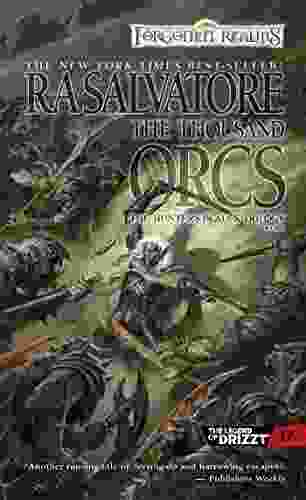
 Avery SimmonsThe Thousand Orcs: A Comprehensive Guide to the Epic Novel by R.A. Salvatore
Avery SimmonsThe Thousand Orcs: A Comprehensive Guide to the Epic Novel by R.A. Salvatore Alex FosterFollow ·9.2k
Alex FosterFollow ·9.2k Leon FosterFollow ·3.2k
Leon FosterFollow ·3.2k Jeremy MitchellFollow ·3.7k
Jeremy MitchellFollow ·3.7k Marc FosterFollow ·15.3k
Marc FosterFollow ·15.3k Jimmy ButlerFollow ·6.9k
Jimmy ButlerFollow ·6.9k Julio Ramón RibeyroFollow ·2.3k
Julio Ramón RibeyroFollow ·2.3k Glen PowellFollow ·18.1k
Glen PowellFollow ·18.1k T.S. EliotFollow ·3.2k
T.S. EliotFollow ·3.2k
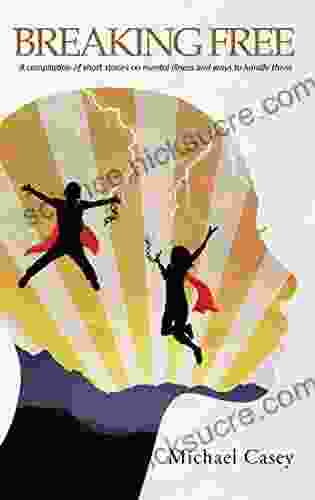
 Deacon Bell
Deacon BellCompilation of Short Stories on Mental Illness and Ways...
Mental illness is a serious issue that affects...
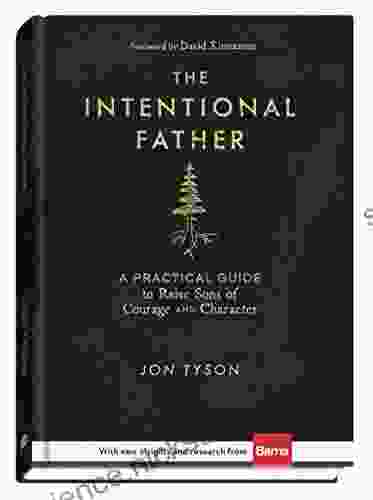
 Jonathan Hayes
Jonathan HayesThe Practical Guide to Raising Courageous and...
As parents, we all want...

 Carlos Fuentes
Carlos FuentesA Journey to Remember: The High Sierra Love Story of...
Prologue: A Wilderness Encounter Beneath...
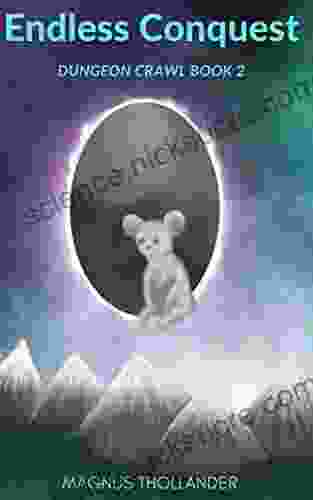
 Douglas Foster
Douglas FosterEndless Conquest: Embark on an Immersive Dungeon Crawl in...
Endless Conquest is a captivating LitRPG...
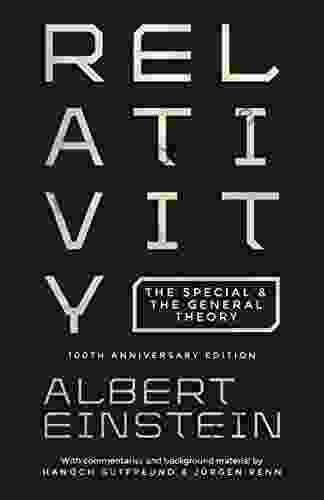
 Caleb Long
Caleb LongThe Special and the General Theory 100th Anniversary...
The year 2015 marks a...
5 out of 5
| Language | : | English |
| File size | : | 14999 KB |
| Text-to-Speech | : | Enabled |
| Screen Reader | : | Supported |
| Enhanced typesetting | : | Enabled |
| Word Wise | : | Enabled |
| Print length | : | 336 pages |


